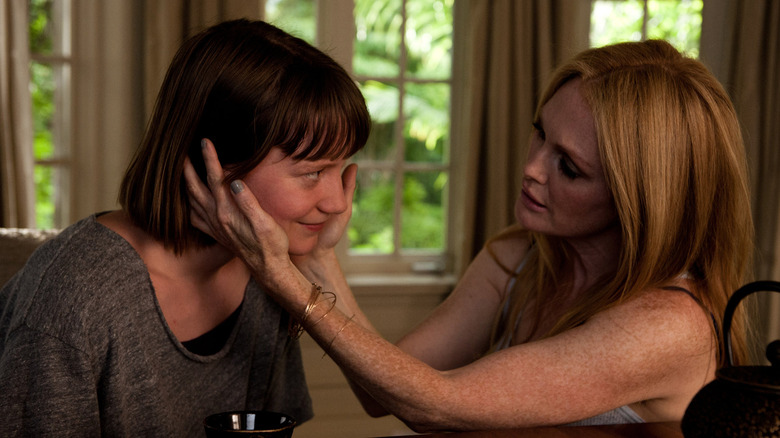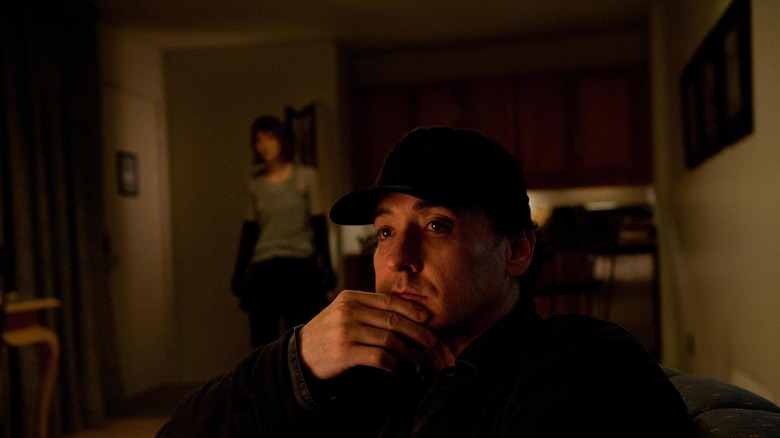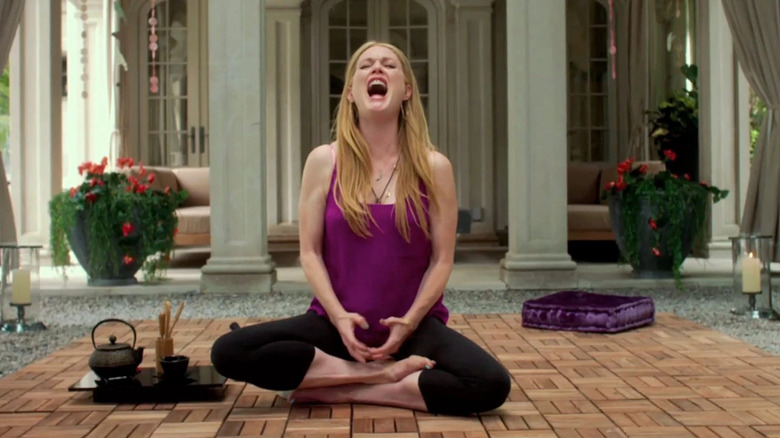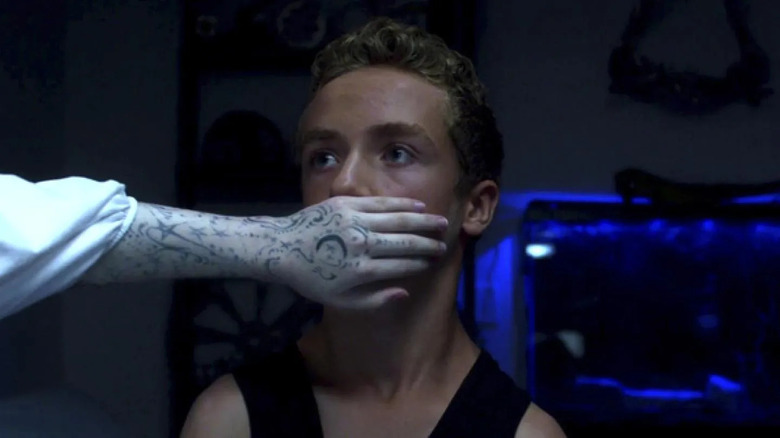David Cronenberg Didn't See Maps To The Stars As Satire
The "showbiz satire" movie is almost as old as the cinematic medium itself. From "Sullivan's Travels" to "The Player" and most recently "Babylon," a look at the darker, goofier, unglamorous, seedier side of moviemaking has become a perennial for Hollywood in more ways than one.
Yet most of these films utilize an exaggerated effect to make their commentary on show business that much more biting, whether it's surrealism (as in Federico Fellini's "8 1/2"), a musical (like "Singin' in the Rain"), or horror (such as "Wes Craven's New Nightmare"). It's rare for such showbiz films to not be satirized in some fashion, yet David Cronenberg's "Maps to the Stars" is just such a movie.
Of course, that depends on who you ask. Most people would see the uncomfortable and darkly hilarious "Maps to the Stars" as unequivocal satire, seeing as how it brings together an ensemble of bizarrely unhinged and sordid characters who simply seem too wild to be true. Cronenberg disagrees, however, believing "Maps" to be a movie that eschews satire for an all-too-unbelievable reality.
'This movie is too realistic to be a satire'
In "Maps to the Stars," David Cronenberg and screenwriter Bruce Wagner depict Los Angeles in 2014 by following the lives of several showbiz characters. There's aspiring actor and limousine driver, Jerome (Robert Pattinson), a fading screen star, Havana (Julianne Moore), her "chore whore" assistant who's also a schizophrenic pyromaniac, Agatha (Mia Wasikowska), Agatha's estranged brother, teen star Benjie (Evan Bird), and the siblings' parents, Benjie's manager Cristina (Olivia Williams) and self-help guru Stafford (John Cusack). Each of these characters has an agenda that seeks to advance their career, status, or otherwise secret goals, and the only thing stopping them is ethics or good taste.
As the film follows them during their daily lives, Cronenberg and Wagner drop in moments of dialogue (not to mention casually explicit sexual encounters) that are shockingly callous before escalating to full-on cruelty. While just about any other film would heighten its satire by contrasting the characters' public and private personas, Cronenberg and Wagner make a point of demonstrating how these people barely mask themselves in public, even Benjie, who clearly has no qualms about being rude in front of a fan who's literally dying of cancer.
As Cronenberg told The Guardian in 2014, it's this tonal approach that separates "Maps to the Stars" from the typical satiric mold:
"The movie is obviously a work of fiction, it's not a documentary on how Hollywood works; it uses compression, exaggeration, all those techniques. But both Bruce and I would resist calling it a satire. Jonathan Swift's 'A Modest Proposal' is a satire, but this movie is too realistic to be a satire. In fact, Bruce has said that every line of dialogue in the movie he has heard spoken by someone. He could probably tell you who."
Drawing a distinction between satire and dramedy
Being a highly erudite, progressive, soft-spoken, and deeply original filmmaker, it's easy to assume that David Cronenberg is a self-serious type of person. However, just about any given interview with him reveals this to not quite be the case. Witness, for instance, his wry joy at rewatching his groundbreaking psychosexual drama "Crash" and exclaiming how he "laughed through the whole thing." If nothing else, the fact that Cronenberg insisted on being cast in a cameo role in "Jason X" and went so far as to write his own dialogue demonstrates that the man has a wicked sense of humor.
All that is to say that Cronenberg may have been a little facetious in refusing "Maps to the Stars" the label of satire. Back when he was looking to get the film produced, the director referred to Bruce Wagner's script as "very acerbic and satirical." Yet he also isn't being hypocritical, instead seeking to make a distinction between the overtly parodic aspects of the showbiz satire versus "Maps to the Stars" being a dramedy that's far more acerbic and character-based. As he said in 2013:
"You could say it's a Hollywood film because the characters are agents, actors, and managers, but it is not a satire like 'The Player.' ... Hollywood is a world that is seductive and repellent at the same time, and it is the combination of the two that makes it so potent. I won't fall back on some cliches or simplistic sloganeering, because the culture and what it reveals about Western culture and the rest of the world is very complex."
An outsider's perspective
Given its setting and subject matter, it's unavoidable that "Maps to the Stars" would be viewed as a commentary on Hollywood and show business in general. The disconnect between the fiction of movies and the harsher, darker reality of the world is certainly an aspect of the film, particularly when it comes to Havana's storyline, which sees her attempting to land the role of her late mother, an actress who abused her as a child. Yet the majority of the film is more concerned with Western cultural attitudes and social mores.
This focus is as quintessentially Cronenberg as sex or body horror; a number of his films, especially "Shivers," "Videodrome," "The Dead Zone," "eXistenZ," "A History of Violence," "A Dangerous Method" and "Cosmopolis" double as cultural observations, their characters delving into ethical and social quandaries in the same way the cast of "Maps to the Stars" do. As Cronenberg put it during his Guardian interview:
"I'm 2,500 miles away from Hollywood and consider myself literally and figuratively halfway between Hollywood and Europe in terms of my cinema sensibility. And being a Canadian, being outside the mainstream of America — as Marshall McLuhan used to say — allows you to have perceptions that you could not have otherwise. Like they say: 'A fish doesn't know what water is.' You have to be outside water to know what water is."
The murderous, facetious, crass, and self-serving characters in "Maps to the Stars" may seem like exaggeration and satire to those of us born and raised in America, and certainly, those of us who wear rose-colored glasses when looking at Western culture. Yet for outsiders like David Cronenberg, such behavior isn't as satiric as we'd like to believe.



